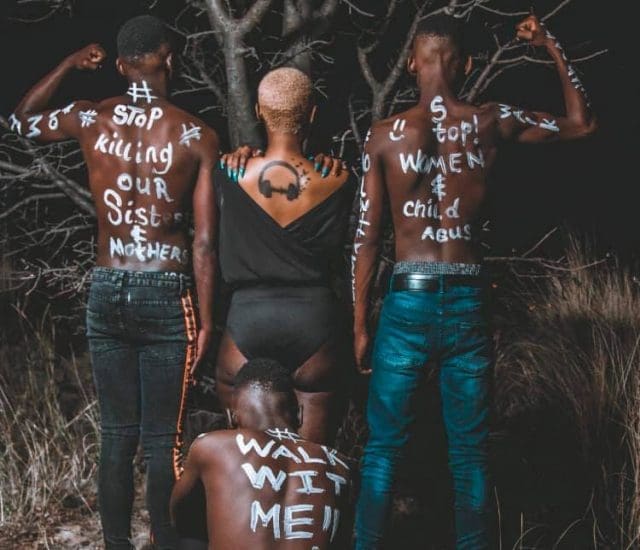Gender-based violence in South Africa is an issue which affected more than 120,000 new victims, predominantly women, immediately after the implementation of a national lockdown in 2020. Though national funding has increased to improve the government’s response to the crisis, cases have not decreased in number. Various civil service groups, including an organization by the name of “Men Against Child Abuse” and the “Black Womxn Caucus” have highlighted the importance of change in cultural and social approaches towards tackling gender-based violence in South Africa, rather than changes in fiscal policies or other governmental initiatives.
Some significant artists have also highlighted alternative approaches to this national “epidemic”. R&B and Afro-soul sensation Loyiso Gijana catapulted himself into the use of his music for social purposes. He advocats to hold accountable perpetrators of gender based violence in South Africa.
Before 2015, Gijana was living a normal life as a university student at Muir College in Uitenhage, South Africa. His life took an unexpected turn after successfully entering the national singing reality show “Idols South Africa,” rising to fame in the country. In line with the tendencies of his digitized generation, his online following now exceeds 230 thousand followers on Instagram. Renowned South Africa Label Ambitiouz Entertainment then decided to sign him and Gijana has since begun creating his own original music. Although his success began with pop, r&b, and soul covers of trendy and commercial songs, Gijana has begun important conversations regarding subjects including mental health and the femicide crisis in South Africa through his music, interviews and social media.
Loyiso Gijana - Madoda Sabelani
Madoda Sabelani, written and voiced by Loyiso Gijana, is a compelling plea to work to end the seemingly endless plague of abuse and violence towards women. Madoda Sabelani, meaning “Men Must Answer” in isiXhosa (a Nguni Bantu language), carries Gijana’s classic Afro-Gospel sound in his heart-felt invocation. Repeating “Ndiya Thandaza nkosi”, meaning “I’m praying lord”, he stresses the desperate nature of his appeal and the grim reality he faces. Almost equally as powerful as the piece, is the visual component which features the pictures of a handful of slain and abused women - one of which was his close friend.
The song, accompanied by the passing images of femicide victims, became not only a cry for help, but a eulogy, remembering the many innocent victims. In an interview with Africa Newzroom, Gijana was moved by the responses to his video. Audiences had taken to his musical plea and had been thoroughly shaken by the images of the victims; some as young as six years old. “People loved it”, Gijana said, but the love shown for his piece, he recognizes, is part of greater solidarity in the ongoing struggle against the senseless targeting of women rather than appreciation for the music alone.
Even after Gijana’s new work was released in June of last year, a rising female artist, DJ Noma, who also was a soldier within the South African National Defense Force, released her second song Walk With Me with a similar aim. Its purpose was to publicly denounce gender based violence which led to the death of thousands of South African women, by contributing to the same movement of which Gijana’s Madoda Sabelani was a part of.
DJ Noma - Walk With Me
Even after such artists have participated both publicly and privately to fight against gender based violence in South Africa, its citizens and refugees within the territory are continuously faced with obstacles to sufficiently protect themselves and their communities from violence. Xenophobia and racial discrimination remain ever present and lack of prosecution and conviction in domestic violence cases, as observed by the United Nations, has only intensified - hence the still unfiled obligation for the South African government, criminal justice system, and law enforcement to improve how domestic violence cases are addressed on a day-to-day basis.
It will be up to musicians to continue this artistic movement for social justice, yet it will also take additional action on behalf of government and local authorities to deliver legal protection to the women of South Africa today.
The author :
Michelle Brucker is a Political Science student from Sciences Po Paris. She is a classical pianist and young writer currently interning at the Center for International Relations and Sustainable Development.
photo : DJ Noma - Nomalizo Penelope Gasa - from facebook
Cet article en anglais est le résultat d’un projet collaboratif entre #AuxSons et Alejandro Abbud Torres Torija, professeur à Sciences Po Paris Campus Reims, et contributeur régulier d’#AuxSons. Dans le cadre du cours “Sons du monde : la musique comme miroir de l’intime et du collectif” des étudiants internationaux de Sciences Po Paris Campus Reims se sont penchés sur les liens entre musiques des quatre coins du monde et enjeux sociopolitiques.
This article is a result of a collaborative project between #AuxSons and Alejandro Abbud Torres Torija, lecturer at Sciences Po Paris Campus Reims, and regular contributor to #AuxSons. As part of the class “Sounds of the world : Music as mirror of the intimate and the collective”, international students from Sciences Po Paris Campus Reims prepared articles presenting contemporary music from different parts of the world in connection with recent socio-political events.


